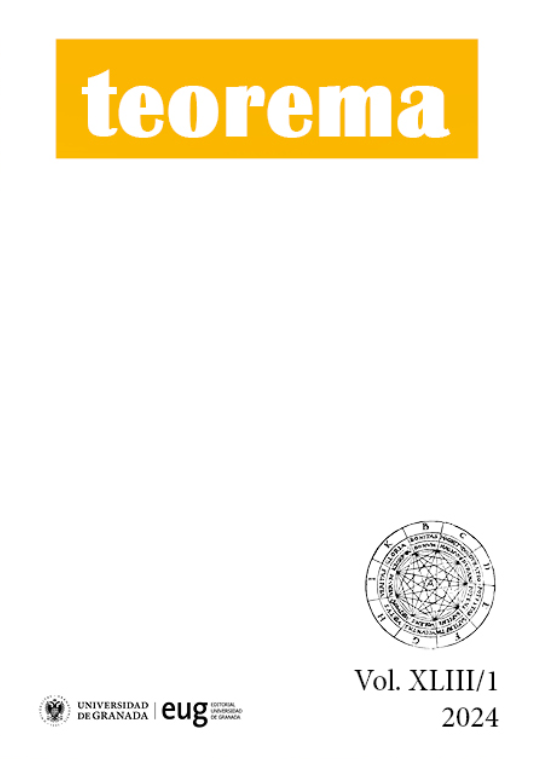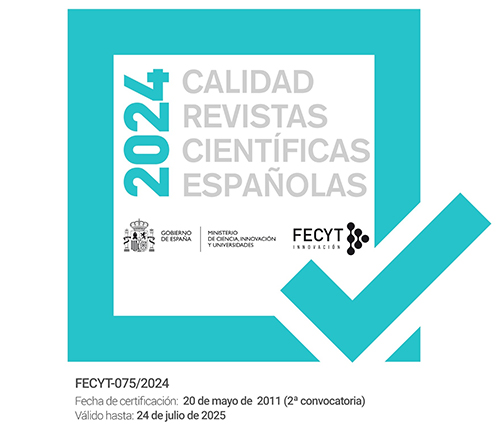Undetermined: Free will in real time and through time
DOI:
https://doi.org/10.30827/trif.34308Palabras clave:
toma de decisiones, juicio, control, responsabilidad, carácterResumen
En su libro Determined, Robert Sapolsky sostiene que nuestros sistemas cognitivos son efectivamente deterministas, de modo que un algoritmo preconfigurado inevitablemente arrojará una única respuesta sobre qué hacer en cada escenario que enfrentamos, sin dejar nada en ese proceso que “dependa de nosotros”. Una visión más realista de la psicología y la neurociencia de la toma de decisiones cuestiona esta impresión determinista y resalta, en cambio, cómo nuestros procesos cognitivos están diseñados para “ajustar el algoritmo” sobre la marcha, precisamente para que podamos averiguar qué hacer en escenarios novedosos donde todas las relaciones contextuales no podrían haber sido preestablecidas. Llevar a cabo estos procesos cognitivos — operando sobre patrones significativos de actividad neuronal, evaluando la saliencia relativa de diversos parámetros, de manera altamente contextual y holística, por razones personales, lo mejor que podemos con información incompleta y componentes ruidosos — es precisamente nosotros decidiendo qué hacer. Esto también debilita el argumento de que no tenemos control sobre cómo se configuran nuestros sistemas neuronales o cognitivos en un momento dado. Algunas de las decisiones que tomamos son sobre nuestra propia cognición y motivaciones: moldeamos nuestro carácter a lo largo del tiempo de maneras que nos permiten actuar como nosotros mismos en tiempo real.
Descargas
Citas
Ackerman, R., & Thompson, V. A. (2017). Meta-reasoning: Monitoring and control of thinking and reasoning. Trends in cognitive sciences, 21(8), 607-617. DOI: https://doi.org/10.1016/j.tics.2017.05.004
Artinger, F. M., Gigerenzer, G., & Jacobs, P. (2022). Satisficing: Integrating two traditions. Journal of Economic Literature, 60(2), 598-635. DOI: https://doi.org/10.1257/jel.20201396
Bandura, A. (2001). Social cognitive theory: An agentic perspective. Annual review of psychology, 52(1), 1-26. DOI: https://doi.org/10.1146/annurev.psych.52.1.1
Banicki, K. (2017). The character–personality distinction: An historical, conceptual, and functional investigation. Theory & Psychology, 27(1), 50-68. DOI: https://doi.org/10.1177/0959354316684689
Bossaerts, P., Yadav, N., & Murawski, C. (2019). Uncertainty and computational complexity. Philosophical Transactions of the Royal Society B, 374(1766), 20180138. DOI: https://doi.org/10.1098/rstb.2018.0138
Cicero. (1913). De Officiis (Walter Miller, trans.). Cambridge, MA: Harvard University Press. DOI: https://doi.org/10.4159/DLCL.marcus_tullius_cicero-de_officiis.1913
Cisek, P. (2019). Resynthesizing behavior through phylogenetic refinement. Attention, Perception, & Psychophysics, 81, 2265-2287. DOI: https://doi.org/10.3758/s13414-019-01760-1
Cisek, P., & Kalaska, J. F. (2010). Neural mechanisms for interacting with a world full of action choices. Annual review of neuroscience, 33(1), 269-298. DOI: https://doi.org/10.1146/annurev.neuro.051508.135409
Del Santo, F. (2021). Indeterminism, Causality and Information: Has Physics Ever Been Deterministic? In A. Aguirre, Z. Merali, & D. Sloan (Eds.), Undecidability, Uncomputability, and Unpredictability (pp. 63-79). Springer International Publishing. DOI: https://doi.org/10.1007/978-3-030-70354-7_5
Del Santo, F., & Gisin, N. (2019). Physics without determinism: Alternative interpretations of classical physics. Physical Review A, 100(6), 062107. DOI: https://doi.org/10.1103/PhysRevA.100.062107
Ellis, G.F.R. (2016). How can physics underlie the mind. Top-Down Causation in the Human Context. Berlin and Heidelberg: Springer-Verlag. DOI: https://doi.org/10.1007/978-3-662-49809-5_4
Faisal, A. A., White, J. A., & Laughlin, S. B. (2005). Ion-channel noise places limits on the miniaturization of the brain’s wiring. Current Biology, 15(12), 1143-1149. DOI: https://doi.org/10.1016/j.cub.2005.05.056
Fleming, S. M., Dolan, R. J., & Frith, C. D. (2012). Metacognition: computation, biology and function. Philosophical transactions of the royal society B: Biological sciences, 367(1594), 1280-1286. DOI: https://doi.org/10.1098/rstb.2012.0021
Fletcher, L., & Carruthers, P. (2012). Metacognition and reasoning. Philosophical Transactions of the Royal Society B: Biological Sciences, 367(1594), 1366-1378. DOI: https://doi.org/10.1098/rstb.2011.0413
Frankfurt, H. (1972). Freedom of the will and the concept of a Person. Journal of Philosophy, 68(1), 5–20. DOI: https://doi.org/10.2307/2024717
Friedman, N. P., & Miyake, A. (2017). Unity and diversity of executive functions: Individual differences as a window on cognitive structure. Cortex, 86, 186-204. DOI: https://doi.org/10.1016/j.cortex.2016.04.023
Gigerenzer, G. & Gaissmaier, W. (2011). Heuristic decision making. Annual Review Psychology, Vol. 62, pp. 451-482 DOI: https://doi.org/10.1146/annurev-psych-120709-145346
Glimcher, P. W. (2004). Decisions, uncertainty, and the brain: The science of neuroeconomics. MIT press. DOI: https://doi.org/10.7551/mitpress/2302.001.0001
Glimcher, P. W. (2005). Indeterminacy in brain and behavior. Annu. Rev. Psychol., 56, 25-56. DOI: https://doi.org/10.1146/annurev.psych.55.090902.141429
Jaeger, J., Riedl, A., Djedovic, A., Vervaeke, J., & Walsh, D. (2024). Naturalizing relevance realization: why agency and cognition are fundamentally not computational. Frontiers in psychology, 15, 1362658. DOI: https://doi.org/10.3389/fpsyg.2024.1362658
Kahneman, D. (2011). Thinking, fast and slow. Farrar, Straus and Giroux.
Kahneman, D. & Tversky, A. (1979). Prospect theory: An analysis of decision under risk. Econometrica, Vol. 47, pp. 163-291 DOI: https://doi.org/10.2307/1914185
Kane, R. (2011). Rethinking free will: new perspectives on an ancient problem. In R. Kane (Ed.), The Oxford Handbook of Free Will (pp. 381–404). New York: Oxford University Press. DOI: https://doi.org/10.1093/oxfordhb/9780195399691.003.0019
Lemos, J. (2015). Self-forming Acts and the Grounds of Responsibility. Philosophia, 43, 135-146. DOI: https://doi.org/10.1007/s11406-014-9561-7
Lemos, J. (2021). The Indeterministic Weightings Model of Libertarian Free Will. Journal of Philosophical Theological Research, (special issue on Free Will), 23(89), 137-156.
Mitchell, K. J. (2023). Free Agents: How Evolution Gave Us Free Will. Princeton University Press. DOI: https://doi.org/10.1515/9780691226224
Mitchell, K. J. (2018). Innate: How the Wiring of Our Brains Shapes Who We Are. Princeton University Press. DOI: https://doi.org/10.1515/9780691184999
Narvaez, D., & Lapsley, D. K. (2009). Moral identity, moral functioning, and the development of moral character. Psychology of learning and motivation, 50, 237-274. DOI: https://doi.org/10.1016/S0079-7421(08)00408-8
Narvaez, D. (2019). Moral development and moral values: Evolutionary and neurobiological influences. In D. P. McAdams, R. L. Shiner, & J. L. Tackett (Eds.), Handbook of personality development (pp. 345–363). The Guilford Press.
Nicholson, D. J. (2013). Organisms≠ machines. Studies in History and Philosophy of Science Part C: Studies in History and Philosophy of Biological and Biomedical Sciences, 44(4), 669-678. DOI: https://doi.org/10.1016/j.shpsc.2013.05.014
Nucci, L. (2019). Character: A developmental system. Child Development Perspectives, 13(2), 73-78. DOI: https://doi.org/10.1111/cdep.12313
Pasupathi, M., & Wainryb, C. (2010). Developing moral agency through narrative. Human Development, 53(2), 55-80. DOI: https://doi.org/10.1159/000288208
Pereboom, D. (2014). The disappearing agent objection to event-causal libertarianism. Philosophical Studies, 169, 59-69. DOI: https://doi.org/10.1007/s11098-012-9899-2
Potter, H. D., & Mitchell, K. J. (2022). Naturalising agent causation. Entropy, 24(4), 472. DOI: https://doi.org/10.3390/e24040472
Potter, H. D., & Mitchell, K. J. (2025). Beyond Mechanism—Extending Our Concepts of Causation in Neuroscience. European Journal of Neuroscience, 61(5), e70064. DOI: https://doi.org/10.1111/ejn.70064
Potter, H. D., Ellis, G. F., & Mitchell, K. J. (2025). Reframing the Free Will Debate: The Universe is Not Deterministic. arXiv preprint arXiv:2503.19672.
Redish, A. D. (2013). The mind within the brain: How we make decisions and how those decisions go wrong. Oxford University Press.
Rich, P., Blokpoel, M., de Haan, R., & van Rooij, I. (2020). How intractability spans the cognitive and evolutionary levels of explanation. Topics in cognitive science, 12(4), 1382-1402. DOI: https://doi.org/10.1111/tops.12506
Rusakov, D. A., Savtchenko, L. P., & Latham, P. E. (2020). Noisy synaptic conductance: bug or a feature?. Trends in Neurosciences, 43(6), 363-372. DOI: https://doi.org/10.1016/j.tins.2020.03.009
Sanborn, A.N., Zhu, J.Q., Spicer, J., León-Villagrá, P., Castillo, L., Falbén, J.K., Li, Y.X., Tee, A. & Chater, N., 2025. Noise in cognition: Bug or feature?. Perspectives on Psychological Science, 20(3), pp.572-589. DOI: https://doi.org/10.1177/17456916241258951
Sapolsky, R. M. (2023). Determined: Life without free will. Random House.
Schopenhauer, A. (1960). Essay on the Freedom of the Will. New York: Dover
Sedley, D. (1983). Epicurus’ refutation of determinism. SUZETESIS, 11–51.
Shadlen, M. N., & Kiani, R. (2013). Decision making as a window on cognition. Neuron, 80(3), 791-806. DOI: https://doi.org/10.1016/j.neuron.2013.10.047
Simon, Herbert A. (1956). Rational Choice and the Structure of the Environment. Psychological Review, 63 (2): 129–138. DOI: https://doi.org/10.1037/h0042769
Simon, H. A. (1990). Bounded rationality. Utility and probability, 15-18. DOI: https://doi.org/10.1007/978-1-349-20568-4_5
Smolin, L., & Verde, C. (2021). The quantum mechanics of the present. arXiv preprint arXiv:2104.09945.
Sterling, P., & Laughlin, S. (2015). Principles of neural design. MIT press. DOI: https://doi.org/10.7551/mitpress/9780262028707.001.0001
Steward, H. (2012). A metaphysics for freedom. Oxford University Press. DOI: https://doi.org/10.1093/acprof:oso/9780199552054.001.0001
Tse, P. U. (2013). The Neural Basis of Free Will: Criterial Causation. The MIT Press. DOI: https://doi.org/10.7551/mitpress/9780262019101.001.0001
van Strien, M. (2021). Was physics ever deterministic? The historical basis of determinism and the image of classical physics. The European Physical Journal H, 46(1), 8. DOI: https://doi.org/10.1140/epjh/s13129-021-00012-x
Vervaeke, J., Lillicrap, T. P., & Richards, B. A. (2012). Relevance realization and the emerging framework in cognitive science. Journal of Logic and Computation, 22(1), 79-99. DOI: https://doi.org/10.1093/logcom/exp067
Descargas
Publicado
Cómo citar
Número
Sección
Licencia
Derechos de autor 2025 Kevin Mitchell

Esta obra está bajo una licencia internacional Creative Commons Atribución-NoComercial 4.0.













